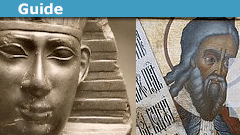Learn About History’s First Science Experiments
In this Insight, I’m going to talk about two of the first science experiments in recorded history. One was allegedly performed by the Prophet Elijah in Israel in the 800s BC [1], the other by the Pharaoh Psammetichus in Egypt in the 600s BC [2]. In each case, we only have one primary source from long after the fact, so it is not necessarily the experiments themselves that are the world’s first, but rather the attestation of these experiments that occurred for the first time in history.
Table of Contents
Key Points
- Elijah allegedly performs an experiment in Israel in the 800s BC to empirically determine the one true god
- Pharaoh Psammetichus in Egypt in the 600s BC allegedly performs an experiment to determine the origin of language – Both experiments were written about long after the fact and likely did not happen as written
- Other quasi–scientific examples from ancient world include King Mithridates‘ attempt to build immunity to poison and the First Emperor of China‘s attempt to find immortality through mercury poisoning
- These are the first recorded instances of attempts at scientific inquiry in history
Elijah Empirically Determines the One True God
Elijah was a prophet in the Northern kingdom of Israel, one of the two biblical kingdoms of the early iron age, that was conquered by the Assyrians in 720 BC. Much of the biblical narrative was written to support the legitimacy of the Southern kingdom of Judah [3], so the kings of Israel as described in the Books of Kings are generally described as evil blasphemers who permit and promote the worship of various Semitic gods. The Book of Kings describes Elijah’s encounter with Ahab, king of Israel.
Ahab ruled in the mid 800s BC. We know that King Ahab actually existed because his defeat in battle is described by the Assyrian king Shalmaneser III, and we know that it was in 852 BC by connecting the list of which Assyrian kings ruled and for how long until a solar eclipse is mentioned having occurred during the reign of Asher-Dan III, which we can trace to 763 BC through our knowledge of astronomy.
Ahab was married to the Jezebel, daughter of the Phoenician King of Tyre (in Lebanon). In the biblical account, Ahab and Jezebel had established the worship of the god Baal. Elijah, believing his god to be the true one, proposed a controlled study to find out which of the two was the correct god to worship. The priests of Baal would prepare a bull for sacrifice and leave it on their altar, and Elijah would leave a bull on his altar, and they would see which one spontaneously caught on fire. The experimental protocol and its results are discussed in 1 Kings, chapter 18, but to summarize, the sacrifice to Baal was left unburnt, while Elijah covered the wood below his bull with water and it still caught on fire. This allowed the Israelites to know which god they should be worship, and subsequently, all the priests of Baal were taken down to the river and murdered.
This study has a number of methodological flaws. The same protocol was not followed for each sacrifice, and priests only gathered a single data point and neglected the possibility that a god was choosing an altar to burn at random. Any attempts at replication were hindered by the murder of the Baal camp, and that is generally frowned upon in scientific circles. While this allegedly occurred in the 800s BC, it probably didn’t happen, and certainly not as written. But when was it actually written about? The Books of Kings are thought to have been first written down in the 600s BC and edited by the 500s and was introduced to the rest of the world when translated to Greek after the 300s BC.
Psammetichus Looks for the Origins of Language
Psammetichus is the Greek name of the pharaoh Psamtik, who ruled Egypt in the 600s BC. He was the first ruler of the 26th dynasty, when Egypt was on the decline as a world power, well, well beyond its heyday. It was one of the last “native” dynasties in Egypt, after the rule of the county was re-conquered from the Nubians (from modern Sudan) and before it was overrun by the Persians. Besides being one of the first scientific grant funders, his reign was not spectacular.
The Greek historian Herodotus, writing around 440 BC, relayed a story that was apparently told to him by priests of Vulcan in Memphis. Psammetichus conducted an experiment to determine which group of people was the oldest and hypothesized that it was either the Egyptians or the Phrygians (Phrygia was a country in modern Turkey after the Hittites fell but before the Greeks rose; their most famous king is Midas). His hypothesis was that the most ancient people would speak a language that is the natural human language. To figure out what that was, he had two common children raised by a shepherd with the instruction never to speak to them, so that they would learn a language without any external influence. According to Herodotus, at the age of two the children started saying the word “Becos,” and Psammetichus’ experts informed him that that was the Phrygian word for bread. Therefore, Phrygian must be the natural human language, and therefore the Phrygians are the oldest people, older even than the Egyptians (going by written works, the Egyptians are roughly tied with the Sumerians).
From a methodological standpoint, this result is somewhat biased in that they expected the first words to come out to either be Egyptian or Phrygian and then matched the first sounds to Phrygian. Perhaps Psammetichus should have hired several translators to listen to the kids without telling him his linguistic expectations, which would have added a layer of blinding to the result.
Unfortunately, Herodotus is the only source for this story. Pharaonic Egypt was highly literate and the pharaohs wrote in great detail about their exploits and achievements, so it is somewhat telling that no Egyptian version of this story has surfaced. Psammetichus may have been the first to attempt this experiment, but he wasn’t the last. It is sometimes referred to as “the forbidden experiment” because of the various ethical issues it raises. It was later attempted by Holy Roman Emperor Frederick II and King James IV of Scotland. To my knowledge, the experiment has not been attempted since the development of scientific ethics, but there is perhaps an analogy with children who are born deaf but whose parents do not realize it until they are several years old.
Herodotus has another interesting semi-scientific story about the Egyptians that also may never have happened, which is that Pharaoh Necho II commissioned some Phoenician navigators to sail down the Eastern coast of Africa and back around the other side, returning through the straits of Gibraltar, proving that the continent that Egypt was on is surrounded by water on all sides. The most interesting thing about the story is that Herodotus is skeptical because the Phoenicians claimed to see the sun in the Northern sky rather than in the South, which was ridiculous to Herodotus but we recognize as signifying that they had crossed the equator.
Odds and Ends
There are a few other quasi-scientific tidbits from the ancient world. King Mithridates of Pontus (North of the Black Sea) was allegedly so afraid of being poisoned that he took small doses of every known poison to build immunity. When circumstances lead him to try to kill himself, he found it impossible because he was immune to the poison he tried to take, thus rejecting the null hypothesis with N=1 that taking small doses of poison does not build immunity. Similarly, the First Emperor of China, who goes by Qin Shi Huang which just means First Emperor of China, allegedly failed to reject the null hypothesis that mercury leads to immortality when he died of mercury poisoning attempting to ward off death.
The two experiments I talked about probably didn’t happen, but it’s still important to note that these are some of the first times that the ancients even wrote about people attempting some form of scientific inquiry.
Further Reading
[1] The History of Herodotus, Book II
[2] The First Book of Kings, Chapter 18
[3] The Bible Unearthed: Archaeology’s New Vision of Ancient Israel and the Origin of Sacred Texts
Ph.D. McGill University, 2015
My research is at the interface of biological physics and soft condensed matter. I am interested in using tools provided from biology to answer questions about the physics of soft materials. In the past I have investigated how DNA partitions itself into small spaces and how knots in DNA molecules move and untie. Moving forward, I will be investigating the physics of non-covalent chemical bonds using “DNA chainmail” and exploring non-equilibrium thermodynamics and fluid mechanics using protein gels.








Ancient Egyptians. Too much to say on this one
According to few sources, Indians knew about zero before other civilizations around the world. Aryabhatta is credited for the invention of zero. Is that whole of the truth or is there more or less to it?
I understand the Mayans had a highly developed Mathematics and knew about 0 .I'd appreciate if you (or any reader of this thread) could provide a link.
[QUOTE="brainpushups, post: 5689663, member: 212884"]Agreed. Including science in the title here is misleading if it is supposed to be serious. And, I don't mean to be overly-critical of your response, but if we're going for accuracy I have a few comments.[/QUOTE]Hi brainpushups. Thanks for your questions. I am not a historian of science. I am relying on my memory of books and articles I have read over the years, on the subject of Greek math and science. My statements are true as far as I know, but I welcome any corrections. I think history speaks for itself regarding the conflict between religion and science. Unfortunately this conflict still goes on in many countries. I don't want to get into a discussion of any specific religion. I recommend the books and videos of Richard Dawkins on this subject.
[QUOTE="john101, post: 5689744, member: 606835"]Isn't a scientific experiment something where you have an idea and you construct something that helps you to test that idea and based on that you refine the apparatus and hence the conclusions?If it's something like that isn't sticking a stick in the ground and marking where the sun casts a shadow over a long period of time an experiment.[/QUOTE]The so-called demarcation criterion which separates science from non science is not as easy to define as one might expect. I think that your example of the gnomon is a good candidate for being one of the first types of scientific activity, but I, at least, had a different criteria in mind when I first read the insight for what would count as an experiment: something that involves both the 'artificial' arrangement of nature and quantitative measurements.
I'm not a scientist.Isn't a scientific experiment something where you have an idea and you construct something that helps you to test that idea and based on that you refine the apparatus and hence the conclusions?If it's something like that isn't sticking a stick in the ground and marking where the sun casts a shadow over a long period of time an experiment.That then develops to where a very sophisticated and accurate apparatus is developed that helps in things like agriculture.again if so, isn't the existence of ancient apparatus like that an indication that at some time before the surviving apparatus was made someone thought of sticking a stick in the ground?I understand the Mayans had a highly developed Mathematics and knew about 0 while the Greeks/Romans did not.
[QUOTE="David Reeves, post: 5686430, member: 608525"]I'm not sure what this article has to do with science. It seems to be a somewhat tongue-in-cheek retelling of some ancient stories or myths.[/QUOTE]Agreed. Including science in the title here is misleading if it is supposed to be serious. And, I don't mean to be overly-critical of your response, but if we're going for accuracy I have a few comments.[QUOTE="David Reeves, post: 5686430, member: 608525"]On the other hand, we do know that ancient Greeks such as Aristotle and Archimedes did have a sophisticated scientific method.[/QUOTE]I think this is misleading. As far as I know Aristotle's observations were casual and, although there is little question that Archimedes was the most noteworthy figure in antiquity as far as the history of science is concerned, I haven't seen any evidence in his extant work that shows that he performed experiments in the modern sense of the term. Indeed, it is hard to imagine how he came to some of his conclusions without experiment, but I haven't seen explicit examples. My main source is Heath's book The Works of Archimedes (though I admit I have not yet read the whole thing).[QUOTE="David Reeves, post: 5686430, member: 608525"]The idea that Greeks, including Aristotle, were armchair philosophers who did not perform experiments, is based on ignorance. For example, in his biological work, Aristotle describes experiments with the development of birds, such as determining the correlation between the size of their egg and the rate of their development.[/QUOTE]I admit that I haven't actually read Aristotle's biological works, but again, Aristotle's observations were casual and all of his claims were embedded in teleology which clearly has no place in modern science.[QUOTE="David Reeves, post: 5686430, member: 608525"]Archimedes describes mechanical experimentation in his work. His approach was to perform experiments to improve theory, which was expressed in a mathematical framework. Unfortunately, we only have fragments of his great work.[/QUOTE]Which fragments are you referring to? I'd like to read them.[QUOTE="David Reeves, post: 5686430, member: 608525"]To sum up, our scientific method began with the Greeks. It is a very great error to confuse the methods of the Greeks, which were carried on and developed during the Hellenistic period, but then crushed by religious authorities, with the disorganized and superstitious ideas of other ancient peoples. The Greeks exalted human reason, they had boundless curiosity, they fostered free discussion and debate, and they emphasized the use of mathematics, even up to the level of rudimentary calculus as found in the works of Archimedes. Perhaps we should focus on their work, if we want to explore the beginnings of experimental science.[/QUOTE]Saying that religious authorities 'crushed' the development of science is an oversimplification that ignores other cultural factors for science's decline. Yes, political and religious figures did contribute to the decline of 'science' in the ancient and early medieval period (for example, when Justinian closed Plato's Academy), but then science moved to the Arab world during the middle ages, and, let's not forget, that the authorities in the Arab world were Muslim. The relationship of science to Christianity is also more complicated than that of suppression of ideas.I would be very interested to learn more about early experiments and, if any extant works actually exist from the ancient world, I would put money on that they would be found in works of the Hellenistic era. I would speculate that the earliest experiments involving measurement would be in the field of optics or astronomy unless there is some unknown (to me at least) work of Archimedes that actually shows he took measurements. The Greeks made incredible advancements during this time given the extent of superstitious thinking that permeated the melting pot of Alexander's fallen empire, but let's not over-romanticize it.Eratosthenes's and Aristarchus's measurements for size of the earth, sun, and moon are all interesting examples and their methods were sound. However, unlike modern science, they did not attempt to quantify their uncertainty which, I would guess, would also be missing from any other examples of controlled experimentation from this time (if they exist). I don't think uncertainty started being considered rigorously until the 18th century.
My view tends to be closer to that of Stephen Jay Gould in ascribing the domains of religion and science to non-overlapping magisteria. Questions about what God is like, the spiritual nature of the human soul (and if there is one), and other ideas regarding the “supernatural” our outside the domain of science.
See:
https://en.wikipedia.org/wiki/Non-overlapping_magisteria
One may or may not have a historical interest in the contest between Elijah and the prophets of Ba’al regarding whether Yahweh or Ba’al is the one true God, but taking the view of Gould (and the National Academy of Sciences) would place questions of this nature in the domain of the supernatural (religion) and outside the realm of natural science.
As in most subjects, there may be some debate and discussion regarding the precise boundaries and whether different magisteria are indeed non-overlapping. However, most would agree that abitrating between deities and fundamentally differing religious claims (Islam, Judaism, Buddhism, Christianity, etc.) is outside the magisterium of experimental science.
I'm not sure what this article has to do with science. It seems to be a somewhat tongue-in-cheek retelling of some ancient stories or myths. None of these accounts describe anything we would call science. In general, I do not notice anything in ancient religious documents that deserves to be called science. On the other hand, we do know that ancient Greeks such as Aristotle and Archimedes did have a sophisticated scientific method. The intellectually superior Greeks believed in a logical universe, and attempted to describe this universe using mathematics, as opposed to a universe operated according to the whim of a supposed deity. Of course the Greeks were only at the beginning of science, so their methods were not always as well developed as ours.The Greeks certainly did perform experiments. Other ancient people experimented as well. Builders experimented with different kinds of cement. Metallurgists experimented with various alloys. And so on. Experiment is certainly a vital part of science. But the essential difference between the Greeks and other ancient people is that the Greeks attempted to explain their observations and experiments within a logical framework, as described by Aristotle. The idea that Greeks, including Aristotle, were armchair philosophers who did not perform experiments, is based on ignorance. For example, in his biological work, Aristotle carefully describes experiments with the development of birds, such as determining the correlation between the size of their egg and the rate of their development. One can contrast Aristotle's approach with the childish speculations of religious writers during the Middle Ages. Following the breakup of the centralized anti-scientific religious authority in Europe, we picked up where the Greeks left off. To sum up, our scientific method began with the Greeks. It is a very great error to confuse the methods of the Greeks, which were carried on and developed during the Hellenistic period, but then crushed by religious authorities, with the disorganized and superstitious ideas of other ancient peoples. The Greeks exalted human reason, they had boundless curiosity, they fostered free discussion and debate, and they emphasized the use of mathematics, even up to the level of rudimentary calculus as found in the works of Archimedes. Perhaps we should focus on their work, if we want to explore the beginnings of experimental science.
Aside from this list?https://en.wikipedia.org/wiki/Timeline_of_scientific_experiments
Does anyone else have examples of early experiments?